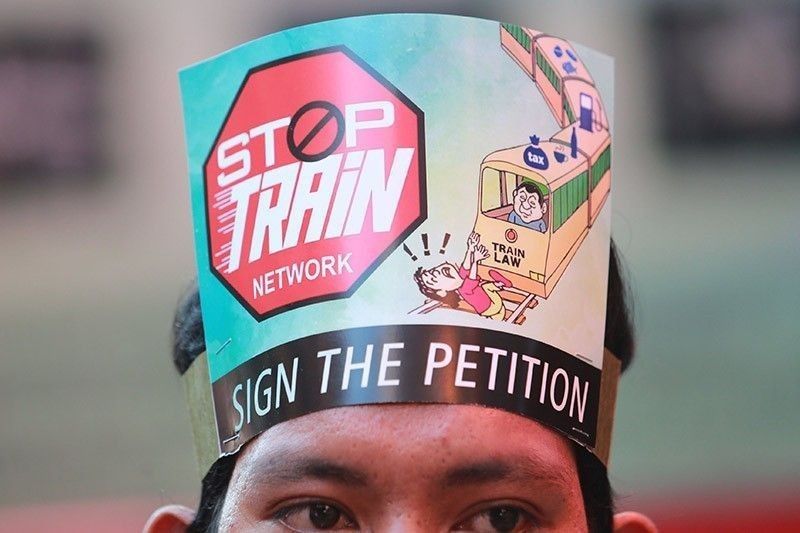Commentary: Don’t tax if you can’t spend

After passing the first package under the Duterte administration’s tax program, lawmakers are now focusing on “TRAIN 2,” which aims to lower corporate income tax rates and rationalize fiscal incentives.
Following President Rodrigo Duterte’s prodding during his third State of the Nation Address, the newly-installed house speaker, Gloria Macapagal-Arroyo, has said that the lower chamber will prioritize the second tranche of the tax reforms.
The senators, however, are reluctant, spooked by public outcry on rising inflation perceived to be sparked by the first tax package and losing the country’s competitive edge and viability for investments that would sustain much needed jobs.
Majority Floor Leader Miguel Zubiri remarked that the second package is not included in the Senate’s priority legislation for the year. While the House of Representatives has already started a series of discussions and consultations on Package 2, the Senate has yet to conduct its own hearing.
However, the executive department, led by the Department of Finance, insists that the second tax package is urgent and necessary.
Philippine businesses are already burdened with the highest corporate income tax (CIT) rate in the region at 30 percent, versus only 17 percent in Singapore. While the CIT revenue is increasing, the efficiency in tax collections is still low.
The country also has a complicated tax incentives system, with 14 different investment promotion agencies and over a hundred different investment laws.
In 2015, the DOF estimates that around P301 billion in revenues were foregone due to incentives. To address the revenue leakage, finance managers are proposing the removal of incentives in certain industries, despite the protests of investment promotion agencies (IPA).
While the government admits that certain incentives are necessary to attract investments, several firms have enjoyed perpetual incentives without producing the desired benefits relative to its costs.
The DOF argues that targeted subsidies are a more effective way of supporting firms. While the second tax package was originally meant to be revenue neutral, it will now be a revenue-generating measure, much like the first tax package. Duterte himself has said that he still needed more funds for his infrastructure drive.
In a welcome development, revenue collections are improving. In 2017, the country registered a tax effort of 14.2 percent, the highest on record since 1998. For the first half of 2018, revenue collections agencies exceeded its targets.
Finance Secretary Carlos Dominguez also reported that the TRAIN Law raised P33.7 billion in revenues for the first half of 2018.
For 2019, the national government aims to raise P3.2 trillion or a 12.7 percent growth in revenues. In addition to tax administration measures, the government has also lined up five more tax packages.
Yet, the potential revenues that could be generated from these succeeding tax packages doesn’t seem enough. In fact, the government intends to borrow P1.19 trillion in 2019, up by 20 percent from this year, and is its highest borrowing program so far. Most of these borrowings will be used to fund infrastructure projects.
However, higher revenues and increased borrowing should be matched by faster cash disbursements. Sadly, despite increases in budgetary allocations, several implementing agencies seem to suffer from a lack of absorptive capacity.
For example, out of the 31 flagship “Build, Build, Build” projects that were scheduled to begin construction this year, only seven have started. The rest are still under review or under development.
Last month, the Commission on Audit released its 2017 audit report. One of its findings was that the Department of Public Works and Highways, which makes up a bulk of infrastructure funds, had difficulty in disbursing its budget.
The agency was only able to disburse 33.6 percent of its budget in 2017 due to the delay or non-implementation of infrastructure projects. This means that it failed to deliver several school buildings, flood control projects, farm-to-market roads, and national highways and bridges.
As state auditors pointed out, the agency was unable to manage the increasing amount of funds entrusted to it, despite receiving a larger budget. The reason behind the delay includes a host of bureaucratic concerns—the same concerns that have hounded past administrations—such as the issuance of permits from local government units and right of way issues.
Economic managers have underscored the urgency in passing the next tax package. In addition to reforming antiquated system, the tax packages in the pipeline are also meant to generate more revenues to finance various social and infrastructure projects.
Unfortunately, it seems that implementing agencies may not yet be up to task. This makes prospective new taxes, supposedly to keep fiscal balance in check, a difficult pill to swallow for most Filipinos.
Budget Secretary Benjamin Diokno, a fierce critic of the previous administration’s underspending, remarked that the delayed or non-delivery of public services is the highest sign of incompetence. The public can only hope that this remark does not presage the administration’s performance.
Weslene Uy is a senior economic research analyst at Stratbase ADR Institute, a partner of Philstar.com.
- Latest




























